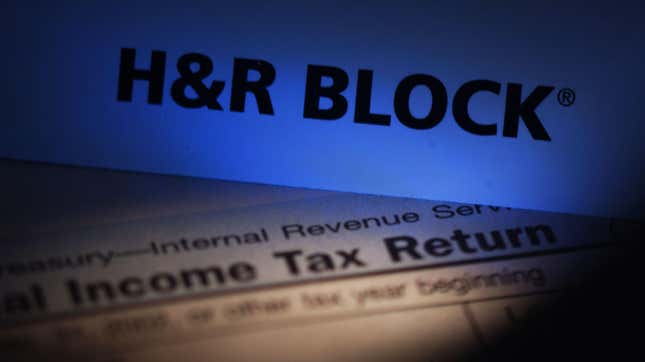
Anyone who has used H&R Block’s tax return preparation services in recent years may have unintentionally helped line Meta and Google’s pockets. That’s according to a new class action lawsuit which alleges the three companies “jointly schemed” to install trackers on the H&R Block site to scan and transmit tax data back to the tech companies which then used elements of the data to engage in targeted advertising.
Attorneys bringing the case forward claim the three companies’ conduct amounts to a “pattern of racketeering activity” covered under the Racketeer Influenced and Corrupt Organizations Act (RICO), a tool typically reserved for organized crime.
“H&R Block, Google, and Meta ignored data privacy laws, and passed information about people’s financial lives around like candy,” Brent Wisner, one of the attorneys bringing forward the complaint said.
The lawsuit, filed in the Northern District of California this week, stems from a bombshell Congressional report released earlier this year detailing the way multiple tax preparation firms, including H&R Block, “recklessly” shared the sensitive tax data of tens of millions of Americans without proper safeguards. At issue are the tax preparation firms’ use of tracking “pixels” placed on their websites. These trackers, which the lawsuit refers to as “spy cams” would allegedly scan tax documents and reveal a variety of personal tax information, including a filer’s name, filing status, federal taxes owed, address, and number of dependents. That data was then anonymized and used for targeted advertising and to train Meta’s AI algorithms, the congressional report notes. The IRS places strong privacy protections over tax data and has rules prohibiting tax preparation firms from using that information for any reason other than assisting in tax returns.
Justin Hunt, a California resident and the main plaintiff in the new lawsuit says he used H&R Block’s software to file his taxes between 2018 and 2013. He claims he was unaware his personal tax data was being “fraudulently intercepted.” If he had known the details of the H&R partnership with the tech companies, he says he wouldn’t have used the service in the first place.
Attorneys representing Hunt argue that H&R Block, Meta, and Google “explicitly and intentionally” entered into an agreement to violate taxpayers’ privacy rights for financial gain. The suit seeks full refunds for Hunt and all US taxpayers who spent money on H&R Block’s services since the tracking began, as well as punitive damages for the three companies’ allegedly illegal conduct. Wisner, the lead attorney bridging the case, previously secured a nearly $90 million dollar settlement against agricultural giant Monsanto.
“Most people would never post their kids’ college account or their retirement savings on Facebook, but H&R Block did something just like that when they handed customer income tax information over to a bunch of advertisers,“ Wisner said in a statement. “It’s like your income tax guy handing your pay stubs and tax returns over to a marketing firm.”
The lawsuit alleges H&R Block used Meta’s Pixel tracking service since at least 2015. Taxpayers who visited sites with the pixel on it would allegedly have information collected which would be stored until they logged on to Meta-owned products like Facebook or Instagram. At that point, according to the suit, Meta would receive a “dossier” of personal data. The suit claims Meta’s pixels still gather some info on users regardless of whether or not they have a Facebook or Instagram account.
“[Tax data]is a currency of its own which may be collected and used by Meta for advertising purposes, which essentially transforms this data into cash profit for Meta,” the complaint reads.
Google, by contrast, allegedly interacted with the tax data through H&R Block’s use of Google Analytics, a free service offered to businesses that collect data from websites. An estimated 70% of the top 100,000 websites use Google Analytics. Though Google bills its tool as a means for businesses to glean insights about potential customers, the lawsuit alleged the search giant deployed Google Analytics to “intercept, track, and collect personal and sensitive information of consumers for its own use.”
Meta did not immediately respond to Gizmodo’s requests for comment. H&R Block explicitly declined when asked for comment. A spokesperson for Google, meanwhile, tried to lay the burden of responsibility on tax preparation services.
“We have strict policies and technical features that prohibit Google Analytics customers from collecting data that could be used to identify an individual,” Google spokesperson José Castañeda told Gizmodo. “Site owners—not Google—are in control of what information they collect and must inform their users of how it will be used.”
The spokesperson said Google has strict policies against advertising to people based on sensitive information. A Meta spokesperson previously told Gizmodo it too has policies prohibiting advertisers from sending sensitive information about people through its business tools. H&R Block’s agreement with Google Analytics, the suit alleges, was similarly “designed” to further the purpose of illegal tax data collection.
H&R Block was just one of several tax preparation companies named by lawmakers in the Congressional report earlier this year. Vermont Sen. Bernie Sanders and Massachusetts Sen. Elizabeth Warren cited the report’s findings in a fiery letter urging the IRS, FTC, DOJ, and Treasury Inspector General to fully investigate the matter and prosecute companies found to have violated tax laws. More civil lawsuits are almost certain to follow as well.
“Big Tax Prep has recklessly shared tens of millions of taxpayers’ sensitive personal and financial data with Meta for years, without appropriately disclosing this data usage or protecting the data, and without appropriate taxpayer consent,” the lawmakers wrote in their report.
Read More: ‘Big Tax Prep’ Shared Sensitive Data With Meta and Google, Congress Says